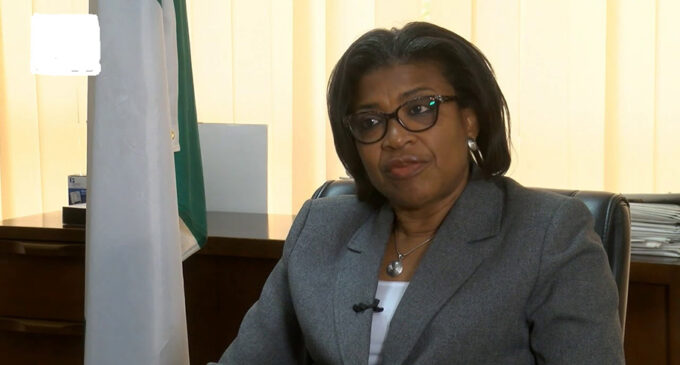The Debt Management Office (DMO) has commended President Bola Tinubu for his economic focus on improved expenditure as a way of reducing public debt levels.
The Director-General of the DMO, Patience Oniha, said this in an interview with the News Agency of Nigeria (NAN) on Friday in Abuja.
Oniha cited the removal of petrol subsidy and the unification of rates in the Foreign Exchange (FX) market, as steps capable of boosting revenue and reducing new borrowing.
She called for increased investment in infrastructure as key to economic growth and development, adding that Public-Private Partnership (PPP) was a more viable option for infrastructure development.
NAN reports that the DMO recently released the Market Access Country-Debt Sustainability Analysis (MAC-DSA) for 2022.
MAC-DSA is a template used to analyse debt levels to determine future debt sustainability.
The DMO stated that the analysis of the results of 2022 MAC-DSA showed that the Total Public Debt-to-GDP ratio, was projected to increase to 37.1 percent in 2023 relative to 23.4 percent as at September 2022.
It said that the proposed increment was due to the inclusion of the N8.80 trillion new borrowings for the year 2023, and the Ways and Means Advances at the Central Bank of Nigeria of over N23 trillion.
It also listed estimated Promissory Notes issuance of N2.87 trillion in the debt stock under the baseline scenario.
“The Country’s debt stock remains sustainable under these criteria.
https://googleads.g.doubleclick.net/pagead/ads?client=ca-pub-7307263092401268&output=html&h=280&slotname=3996547260&adk=1216252417&adf=3883071297&pi=t.ma~as.3996547260&w=678&fwrn=4&fwrnh=100&lmt=1687524992&rafmt=1&format=678×280&url=https%3A%2F%2Fnewsdiaryonline.com%2Fdmo-lauds-tinubu-makes-case-for-improved-revenue-less-borrowing%2F&host=ca-host-pub-2644536267352236&fwr=0&fwrattr=true&rpe=1&resp_fmts=3&wgl=1&uach=WyJXaW5kb3dzIiwiMTAuMC4wIiwieDg2IiwiIiwiMTE0LjAuNTczNS4xMzQiLFtdLDAsbnVsbCwiNjQiLFtbIk5vdC5BL0JyYW5kIiwiOC4wLjAuMCJdLFsiQ2hyb21pdW0iLCIxMTQuMC41NzM1LjEzNCJdLFsiR29vZ2xlIENocm9tZSIsIjExNC4wLjU3MzUuMTM0Il1dLDBd&dt=1687524986382&bpp=2&bdt=552&idt=5946&shv=r20230620&mjsv=m202306161001&ptt=9&saldr=aa&abxe=1&cookie=ID%3D29df73ef16f2cda0-224def9e21d700b0%3AT%3D1668074006%3ART%3D1687524751%3AS%3DALNI_MYonaGwzfB4esDzBcLDbS0lhiMOug&gpic=UID%3D00000b1e0fab660b%3AT%3D1668074006%3ART%3D1687524751%3AS%3DALNI_MZvMtkX57ymasv1TMaH16lzVHyzlQ&prev_fmts=1080×280%2C678x170%2C336x280%2C336x280&correlator=1893359234255&frm=20&pv=1&ga_vid=1018294046.1668073955&ga_sid=1687524992&ga_hid=1479626401&ga_fc=1&u_tz=-420&u_his=3&u_h=768&u_w=1366&u_ah=728&u_aw=1366&u_cd=24&u_sd=0.75&dmc=4&adx=384&ady=2737&biw=1798&bih=833&scr_x=0&scr_y=333&eid=44759876%2C44759927%2C44759842%2C31071756%2C31075465%2C31075474%2C44788441&oid=2&pvsid=1558661151774550&tmod=1602251242&uas=3&nvt=1&ref=https%3A%2F%2Fnewsdiaryonline.com%2F&fc=1920&brdim=0%2C0%2C0%2C0%2C1366%2C0%2C1366%2C728%2C1821%2C833&vis=1&rsz=%7C%7CoEebr%7C&abl=CS&pfx=0&fu=128&bc=31&ifi=6&uci=a!6&btvi=3&fsb=1&xpc=L63kgXJnOR&p=https%3A//newsdiaryonline.com&dtd=5979
“But the borrowing space has been reduced when compared to the Nigeria’s self-imposed debt limit of 40 per cent set in the Medium-Term Debt Management Strategy (MTDS), 2020-2023.
“On the other hand, Debt Service-to-Revenue ratio at 73.5 percent in 2023 exceeds the recommended threshold of 50 per cent due to low revenue, which means that there is need to significantly increase government revenue.
“Under the alternative scenario, the total public Debt-to-GDP ratio at 45.4 per cent in 2023 exceeds the Nigeria’s self-imposed debt limit of 40 percent ” it said.
https://googleads.g.doubleclick.net/pagead/ads?client=ca-pub-7307263092401268&output=html&h=280&slotname=3996547260&adk=1216252417&adf=2424159541&pi=t.ma~as.3996547260&w=678&fwrn=4&fwrnh=100&lmt=1687524992&rafmt=1&format=678×280&url=https%3A%2F%2Fnewsdiaryonline.com%2Fdmo-lauds-tinubu-makes-case-for-improved-revenue-less-borrowing%2F&host=ca-host-pub-2644536267352236&fwr=0&fwrattr=true&rpe=1&resp_fmts=3&wgl=1&uach=WyJXaW5kb3dzIiwiMTAuMC4wIiwieDg2IiwiIiwiMTE0LjAuNTczNS4xMzQiLFtdLDAsbnVsbCwiNjQiLFtbIk5vdC5BL0JyYW5kIiwiOC4wLjAuMCJdLFsiQ2hyb21pdW0iLCIxMTQuMC41NzM1LjEzNCJdLFsiR29vZ2xlIENocm9tZSIsIjExNC4wLjU3MzUuMTM0Il1dLDBd&dt=1687524986384&bpp=1&bdt=553&idt=6082&shv=r20230620&mjsv=m202306161001&ptt=9&saldr=aa&abxe=1&cookie=ID%3D29df73ef16f2cda0-224def9e21d700b0%3AT%3D1668074006%3ART%3D1687524751%3AS%3DALNI_MYonaGwzfB4esDzBcLDbS0lhiMOug&gpic=UID%3D00000b1e0fab660b%3AT%3D1668074006%3ART%3D1687524751%3AS%3DALNI_MZvMtkX57ymasv1TMaH16lzVHyzlQ&prev_fmts=1080×280%2C678x170%2C336x280%2C336x280%2C678x280&correlator=1893359234255&frm=20&pv=1&ga_vid=1018294046.1668073955&ga_sid=1687524992&ga_hid=1479626401&ga_fc=1&u_tz=-420&u_his=3&u_h=768&u_w=1366&u_ah=728&u_aw=1366&u_cd=24&u_sd=0.75&dmc=4&adx=384&ady=3241&biw=1798&bih=833&scr_x=0&scr_y=333&eid=44759876%2C44759927%2C44759842%2C31071756%2C31075465%2C31075474%2C44788441&oid=2&pvsid=1558661151774550&tmod=1602251242&uas=3&nvt=1&ref=https%3A%2F%2Fnewsdiaryonline.com%2F&fc=1920&brdim=0%2C0%2C0%2C0%2C1366%2C0%2C1366%2C728%2C1821%2C833&vis=1&rsz=%7C%7CoEebr%7C&abl=CS&pfx=0&fu=128&bc=31&ifi=7&uci=a!7&btvi=4&fsb=1&xpc=7lihnrP4Yk&p=https%3A//newsdiaryonline.com&dtd=6096
It said that the Debt Service-to-Revenue also exceeded the recommended threshold of 50 percent.
As part of its recommendations based on the MAC-DSA, the DMO called for moderation in new borrowings.
“The Baseline analysis projects total public Debt-to-GDP ratio at 37.1 per cent for 2023, indicating a borrowing space of 2.9 per cent (equivalent of about N14.66 trillion) when compared to the self-imposed limit of 40 percent.
“But it is recommended that this should not be used as a basis for higher level of borrowing as was the case in the 2023 Budget.
“This is because the outcome of the Shock Scenario, which is more realistic in the circumstances, exceeded the self-imposed limit,” it said.
It added that the projected Federal Government of Nigeria (FGN) Debt Service-to-Revenue ratio at 73.5 percent for 2023 is high and a threat to debt sustainability.
According to the DMO, it means that the revenue profile cannot support higher levels of borrowing.
“Attaining a sustainable FGN Debt Service-to-Revenue ratio would require an
increase of FGN revenue from N10.49 trillion projected in 2023 budget to about N15.5 trillion,” it said.
https://googleads.g.doubleclick.net/pagead/ads?client=ca-pub-7307263092401268&output=html&h=280&slotname=2153813618&adk=1155457412&adf=1923455593&pi=t.ma~as.2153813618&w=336&lmt=1687524992&format=336×280&url=https%3A%2F%2Fnewsdiaryonline.com%2Fdmo-lauds-tinubu-makes-case-for-improved-revenue-less-borrowing%2F&host=ca-host-pub-2644536267352236&wgl=1&adsid=ChEI8IXVpAYQ2Ka39b_LhrCIARI9AK9xuclCcROXABviBA1im4tbZjxiVdB9ozXCiil09zNjywAsc9fkWU_7th9Kq-G4TWAJdaQgUFb5rI7bkw&uach=WyJXaW5kb3dzIiwiMTAuMC4wIiwieDg2IiwiIiwiMTE0LjAuNTczNS4xMzQiLFtdLDAsbnVsbCwiNjQiLFtbIk5vdC5BL0JyYW5kIiwiOC4wLjAuMCJdLFsiQ2hyb21pdW0iLCIxMTQuMC41NzM1LjEzNCJdLFsiR29vZ2xlIENocm9tZSIsIjExNC4wLjU3MzUuMTM0Il1dLDBd&dt=1687524986386&bpp=1&bdt=555&idt=6121&shv=r20230620&mjsv=m202306161001&ptt=9&saldr=aa&abxe=1&cookie=ID%3D29df73ef16f2cda0-224def9e21d700b0%3AT%3D1668074006%3ART%3D1687524751%3AS%3DALNI_MYonaGwzfB4esDzBcLDbS0lhiMOug&gpic=UID%3D00000b1e0fab660b%3AT%3D1668074006%3ART%3D1687524751%3AS%3DALNI_MZvMtkX57ymasv1TMaH16lzVHyzlQ&prev_fmts=1080×280%2C678x170%2C336x280%2C336x280%2C678x280%2C678x280&correlator=1893359234255&frm=20&pv=1&ga_vid=1018294046.1668073955&ga_sid=1687524992&ga_hid=1479626401&ga_fc=1&u_tz=-420&u_his=3&u_h=768&u_w=1366&u_ah=728&u_aw=1366&u_cd=24&u_sd=0.75&dmc=4&adx=555&ady=3501&biw=1798&bih=833&scr_x=0&scr_y=333&eid=44759876%2C44759927%2C44759842%2C31071756%2C31075465%2C31075474%2C44788441&oid=2&pvsid=1558661151774550&tmod=1602251242&uas=3&nvt=1&ref=https%3A%2F%2Fnewsdiaryonline.com%2F&fc=1920&brdim=0%2C0%2C0%2C0%2C1366%2C0%2C1366%2C728%2C1821%2C833&vis=1&rsz=%7C%7CoeEbr%7C&abl=CS&pfx=0&fu=0&bc=31&jar=2023-06-19-02&ifi=8&uci=a!8&btvi=5&fsb=1&xpc=VHq3yU0UvO&p=https%3A//newsdiaryonline.com&dtd=6392
With respect to expansion in fiscal deficit, the DMO said that there was need to strictly adhere to the provision of extant legislations on government borrowing.
It specifically called for adherence to the Fiscal Responsibility Act 2007 and Central Bank of Nigeria Act, 2007 as it relates to Ways and Means Advances, in order to moderate the growth rate of public debt.
It also emphasised the need to prioritise revenue generation.
“There is urgent need to pay more attention to revenue generation by implementing far reaching revenue mobilisation initiatives and reforms including the Strategic Revenue Growth Initiatives and all its pillars.
“This is with a view to raising the country’s tax revenue to GDP ratio from about seven per cent (one of the lowest in the world) to that of its peers.
“Government should encourage the private sector to fund infrastructural projects through the PPP schemes and take out capital projects in the budget that are being funded from borrowing to reduce budget deficit and borrowing.
“Government can also reduce borrowing through privatisation and sale of government assets,” the DMO said. (NAN)
